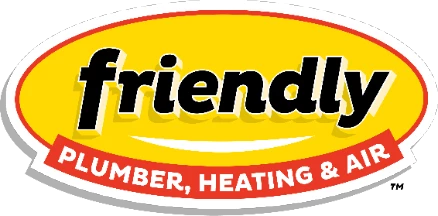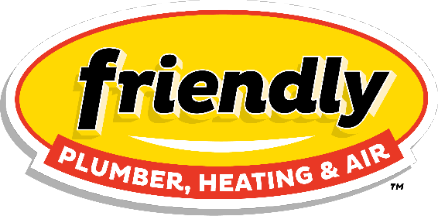Heat Pump Vs. Furnace; Which is Best for Your Home?

Looking to install a new heating system in your Salt Lake City home? Your two most popular choices are a heat pump and a furnace. Each one has advantages and disadvantages when compared to the other.
In this blog, we will compare heat pumps to furnaces to help you determine which type of heating system is right for your home. And remember, you can always call one of our heating, ventilation, and air conditioning (HVAC) professionals at Friendly Plumber, Heating and Air for more clarity on this whole subject.
What About a Heat Pump?
The short version of how a heat pump works is that it transfers heating energy from inside to outside during the cooling season, and outside to inside during the heating season. Heat pump technology works on the same philosophy as an air conditioner.
Like air conditioners, air source heat pumps do not generate heat by burning natural gas or other fossil fuels. Instead, they simply move heat energy around between the indoor air and outdoor air supply using an air handler and an outdoor unit.
An electric heat pump system is not only a heating system, but it is also an air conditioner, so essentially you get a two-for-one heating and cooling system. Here are the pros and cons of a heat pump:
Heat Pump Pros
- Runs cleaner. A heat pump runs off electricity, so it uses a cleaner source of energy than natural gas or oil. Heat pumps can create one-and-a-half to three times more energy than they use, so they are more energy efficient than a gas furnace or electric furnace.
- Can be safer. Because a heat pump runs on electricity, there is no risk of carbon monoxide poisoning or gas explosions as there can be with a gas furnace.
- Can provide both heating and cooling. In other words, an air source heat pump is convenient and could be more cost-effective than a gas furnace or electric furnace in the right home. Moreover, there are no added components or elements. Just be sure to keep the heat pump well maintained, because the US Department of Energy (DOE) notes how this can result in a 10 to 25 percent difference in energy consumption as compared to a neglected one.
Heat Pump Cons
- Can be more expensive to run. Since a heat pump system operates entirely on electricity, it can cost you more to run—electricity energy costs are generally higher than natural gas or oil. Of course, all of this depends on the price of electricity and the energy efficiency of your heat pump.
- Can sometimes only be used for heat in mild climates. Some heat pump systems do not work as well in cold climates and only heat well in temperatures over 35 to 40 degrees Fahrenheit. Electric heat pumps are an ideal choice for the southeastern coastal part of the United States or California, but are not always ideal for homes in cold climates. Otherwise, your Salt Lake City home will need a supplemental heating system, which usually involves installing a natural gas furnace. This is known as a dual-fuel heating system.
- Has a shorter life span. A heat pump has an average projected life span of 12 to 15 years, while a furnace has an average 15 to 20-year life span. Electric heat pumps suffer more wear and tear since they run year-round, as opposed to a gas furnace or electric furnace that typically runs only a few months a year.
What About a Furnace?
Furnaces use natural gas, propane, electricity or oil to generate heat that is then distributed throughout the house via a central heating system. The heater ignites the fuel or uses electric resistance, and heat exchangers heat the air. The blower forces heated air through the duct system that channels it to various rooms in the house.
Furnaces are designed to be reliable, efficient, and easy to use, providing homeowners with the comfort and warmth they need during cold weather months. Homeowners throughout Utah can take advantage of furnaces with up to a 96% AFUE rating. This means that 96% of the fuel used by the furnace is converted into heat for the home, providing more comfortable temperatures and lower energy bills.
The pros and cons of using a furnace include:
Furnace Pros
- Has a longer life span. Running only a few months of the year, the life span of a gas furnace or electric furnace is longer than that of a heat pump. Most furnaces nowadays can last 15 to 20 years.
- Requires less maintenance. Since a furnace is utilized only part of the year, the system experiences less wear, resulting in fewer repairs with proper annual maintenance by a professional—like one of our Friendly Plumber, Heating and Air HVAC experts.
- Can be used in homes everywhere. A furnace can be installed in any climate, regardless of the temperature, including your Utah home. However, gas furnaces do require gas lines in the home, so you need to consider the availability of natural gas in your area as you look into gas heating.
Furnace Cons
- No air conditioning. Since a furnace can only heat air, you would need to make an additional investment in an air conditioner. A heat pump, on the other hand, also functions as an air conditioner so you do not have to install separate equipment.
- Not as safe. Any time gas or oil is involved, there is an inherent safety risk of fire or an explosion, no matter how minimal the risk. And with gas furnaces, a carbon monoxide leak is possible.
- Not as environmentally friendly to run. Gas and oil do not burn as efficiently as electricity. Their burning produces toxic gasses released into the environment.
Tax Credits for High-Efficiency Furnaces, Dual-Fuel Furnaces, and Heat Pumps
In an effort to promote energy efficiency and reduce the environmental impact of heating systems, the government began introducing tax credits for qualifying high-efficiency furnaces, dual-fuel furnaces, and heat pumps. These incentives aim to encourage residents and businesses alike to make environmentally responsible choices when it comes to their heating systems.
Utah’s tax credits for high-efficiency furnaces, dual fuel furnaces, and heat pumps provide an excellent opportunity for its residents and businesses to not only lower their heating and cooling costs but also to actively participate in the state’s commitment to environmental responsibility.
Get in touch with Friendly Plumber, Heating and Air today to learn more about how you can take advantage of these valuable tax credits and make the most of your heating and cooling system upgrades.
What It All Comes Down To
As far as which is a better choice, you should take into account several important factors–– such as the Salt Lake City area’s climate, the energy rates for electricity and gas, and how environmentally friendly the energy source would be––and go from there.
If you have more concerns regarding heat pumps vs. furnaces, do not hesitate to contact our highly trained and knowledgeable Friendly Plumber, Heating and Air team.
We Are Your Furnace and Heat Pump Experts
Friendly Plumber, Heating and Air is a team of fully licensed professionals. If you have any questions or need to schedule service, give us a call or contact us online.
We service Salt Lake City, UT, and its surrounding areas, offering furnace and heat pump expertise, along with installation and replacement, repairs, maintenance, and more.


